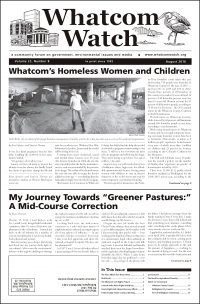by Lorraine Loomis
Treaty tribes in western Washington have won some recent treaty rights battles, but we continue to lose ground in the war to restore and protect salmon and their habitat.
The 9th Circuit Court of Appeals ruled unanimously on June 27 that the state is violating U.S. treaties with tribes by allowing failing culverts to block salmon from more than 1,000 miles of habitat.
The ruling upheld a 2013 injunction requiring the state to fix most of those culverts by 2017. The decision makes clear that the treaties promised continued tribal fishing rights, which requires habitat to be protected so that fish are available for harvest.
In another huge win for treaty rights and protection of natural resources, the U.S. Army Corps of Engineers in May denied a permit for a coal export terminal on Lummi Nation fishing grounds at Cherry Point. The Gateway Pacific Terminal would have been the largest coal export terminal in the country. Its impact to the environment and the tribe’s treaty fishing rights would have been irreparable.
But amidst this good news comes the treaty tribes’ 2016 State of Our Watersheds. It reminds us that salmon habitat is being lost and damaged faster than it can be restored, while salmon populations continue to decline. The report and an interactive map are available at http://geo.nwifc.org/sow.
We first documented this trend across 20 western Washington watersheds in our 2012 State of Our Watersheds report. Our research showed that even the recent economic recession had little effect in slowing the loss and decline of salmon habitat in our watersheds.
As the economy continues to recover, habitat loss and damage is picking up steam again. We are losing ground by every measurement we have.
• Increased armoring of riverbanks and marine nearshore areas are harming salmon and the forage fish that are essential to their survival.
• Forestlands that help keep salmon streams cool continue to disappear.
• The amount of impervious surfaces like roads and parking lots continues to grow, increasing polluted stormwater runoff that kills salmon.
• Overdevelopment of floodplains essential to healthy river systems and good salmon habitat continues at an alarming rate.
These are just a few of the chronic environmental problems we all face that will only get worse as a million more people move here in the next 20 years. Meanwhile, climate change is magnifying and accelerating the effects of lost and damaged habitat.
We must do more if we are to turn the tide for salmon. Some of the immediate steps state government can take include:
• Declare a statewide emergency for salmon. Engage state agencies with regulatory authority — as well as the public — in the effort.
• Stop permitting habitat loss. Place a moratorium on development permits until the process can be revised with standards that prevent further habitat destruction.
• Make sure our water is clean. Complete the revision of current water quality rules for human health, then move quickly to update criteria that protect fish. Also, improve stormwater rules to better control the flow of toxics into our waters.
• Ensure enough water for fish. Complete and enforce instream flow requirements for fish.
As the Culvert Case and Cherry Point decisions confirmed, the federal and state governments have both a trust responsibility and the legal authority to protect tribal treaty rights and resources. This protection benefits every single person who lives here and cares about clean water and salmon recovery.
Creating the change needed to protect salmon and restore their habitat will take time and all of us working together. No one ever said salmon recovery would be easy. But if the treaty Indian tribes in western Washington didn’t think it was possible, we wouldn’t be working so hard. And if it weren’t for tribes and their treaty rights, salmon and their habitat would be in far worse shape today.
_____________________________________
Lorraine Loomis is the chair of the Northwest Indian Fisheries Commission. www.nwifc.org





























